The Paradox of Free Time
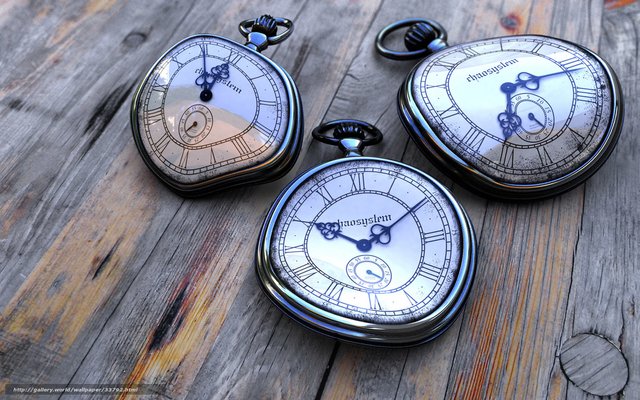
You may have noticed that the older you get, the faster time flies. This hypothesis was describe by Alvin Toffler with a simple formula: the rate of flow of time is inversely proportional to the free time that we have. In a childhood is rife, but with the years due to study and work free time decreases and life is rushing faster. How much free time do we have actually?
Almost 90 years ago, English economist John Maynard Keynes published an essay on the topic of how technologies of the future will change people's lives. The main idea was that by 2028 the number of working hours would significantly decrease to 3-4 hours a day (without harm to the economy). People will have more time to live, not only work. They will enjoy free time to develop themselves to relax, to love, to play.
Free time is not free
Well, we are in "one step" from 2028, and recent researches show that the total number of working hours in the world is gradually decreasing. It's associated with the development of network technologies that allow us to work remotely and more productively, also they greatly simplify many tasks, routine processes automated, the high efficiency achieved in a shorter time, work became more machine-based. In addition to working processes, we ceased to waste time on household chores. For example: over the past 30 years, the time spent on housework fell by 30% thanks to the development of household appliances.
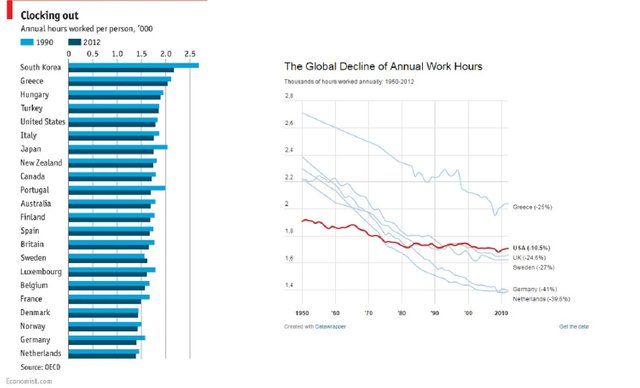
image source left | right
But, there is an interesting paradox: today, when people have more free time, they feel more and more busy. In front of us constantly looming unfinished business, a lots of plans, responsibilities, we work at nights, cancel meetings with friends, thrown to read books for pleasure, because we think that we have no time for that. This is the flip side of technology development. According to recent polls 62% of citizens (who live in Megapolises) say that they have no more than 1-2 hours of free time a day.
How it can be that we need to work less, but feel more busy than early, that the most of us have only few hours, which we can spend on something without thinking and planning?
We have freed a time for the body, but have took it from the brain. We have lost the line between the work process and actions outside of work. While working, we constantly use the Internet, not only on business issues. In parallel, we can read interesting articles, sit in social networks, chat with friends etc. Coming home, we continue to repeat these steps, for example searching for a movie to watch or places to visit and relax.
The ability to send and receive messages for work at any time causes the brain to be ready always. Because of this, he cannot adequately separate work area and relaxation area. In fact, brain is in working condition all time, ready to take in new information and trying to process it as quickly as possible. Why do we do it? Because subconsciously we are afraid to miss something important. It's information overload. The choice between a large numbers of options for leisure makes the brain works the same as at work.
Multitasking
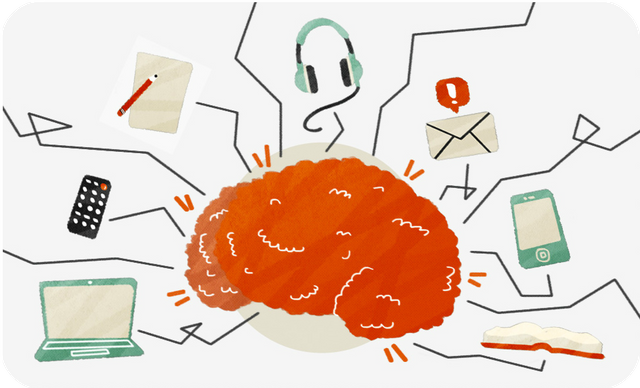
image source
The development of digital technologies allows you to simultaneously perform more tasks than before, and it gave rise to the myth of Multitasking. In fact is visibility. Multitasking doesn't exist. Brain solves problems in order, one by one, just doing it very quickly. In fact, we don't solve 2-3 parallel tasks, we switch between them, thereby reducing the concentration of the whole brain. Moreover, tasks of a different nature uses different areas of the brain, the work goes on in several parts of it. Such a system tiring stronger than full concentration on one task to its final solution, and then skip to another.
According to another research over the past 13 years, the average time that we spend on the concentration on some issue or object dropped from 12 seconds to 8.Thus, 44% of respondents admitted that they have to make significant efforts to concentrate on their tasks. Especially it was express in people who often and in large quantities use a variety of modern information technologies in everyday life. It's not an advantage, It’s not an evolution of our way of thinking, it’s a necessary speed that the modern world dictates to us. The decrease in time of concentration makes the brain works harder to solve problems more effectively.
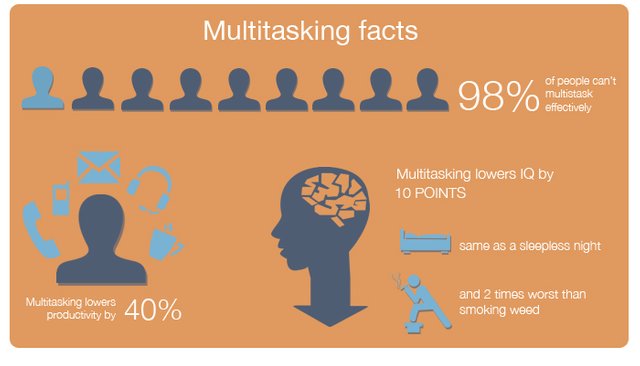
image source
The dopamine addiction
Psychologist Aoife McLoughlin, put forward the theory that the technical gadgets speed up the processing of information by the brain and, thus, distort the subjective perception of time. It seems that time is becoming a more information-rich, it's like a doping, and our brain constantly backs up, motivates, requires new information.
What are the consequences of such a doping? After a successful solution of the problem, issue or question, our brain secretes dopamine (happiness hormone). The more complex the task, more effort, time and resources we spent on its solution, the greater the dopamine's dose falls into our brain. The decrease in the concentration in the solution of the problem reduces the joy of its, as well as a large number of such decisions dulls the sensations from the release dopamine. Thus, people feel the taste of life worse, and seemed to cease to experience happiness from the very fact of existence.
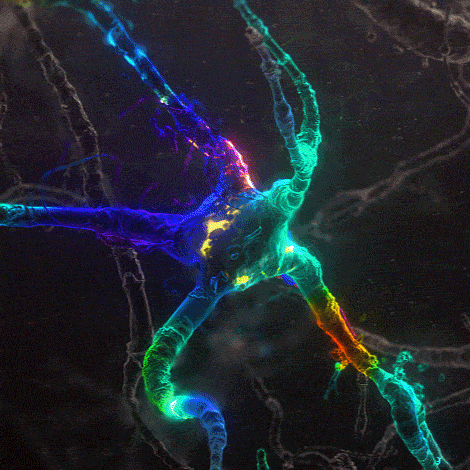
image source
To feel happy fully we need to make something bigger each time and we live permanently in this race, thus deprived of the opportunity to decide a single but daunting task, littered with a bunch of small. (Along with dopamine, is also produced by cortisol — the "stress hormone". It affects a number of organs) It causes stress, chronic fatigue syndrome, sleep disturbances, increased levels of depression, dissatisfaction.
As a result, that causes in us the need to protect our time. It seems to us that we never have it enough. We think about how to be alone, to rest from all this racing, relax. Resting we also use gadgets, we are constantly in touch, ready to start, waiting for news. We have forgotten how to relax.
Conclusion
Technologies are an absolute good. Another question is how we use them. Thanks to technologies, we can to do all in 10s times faster than the past generation. We have lost the habit of doing nothing, today, returning home after work, no one sits down with a bottle of beer in front of TV, today we at any time seek to consume information (for fun, for education, for killing time).
living in a huge flow of information and things we must learn to distinguish between work and non-working time. You cannot earn all the money in the world, you cannot be always in trend, you cannot visit all places and events, it’s not necessary to pursue this. In the pursuit of happiness you will lose all the happiness. Therefore, it is important at least sometimes emerge from the flow of information and to breathe by a normal, quiet life. - @natord
Follow Me
image source 1
some sources about researches: Dopamine | The Myth That Americans Are Busier Than Ever | The impact of modern technology on the ability to concentrate | Wired society speeds up brains … and time | "No Time" By Elizabeth Kolbert ... and others in "image source"
very close to my own feelings and thoughts about time. I think, to try to relax without gadgets is the possible solution. To be more natural. Get out of megalopolis and spend time walking, playing with animals..
I agree with you. also physical work contributes to the good discharge. But we don't have enough time for it, or we think that don't have it :)
and I'am not sure that we need of all information.
You are right we don't need i all. Our mind didn't learn to sort this amount of information without expending serious resources yet.
Good points.
I additionally see it this way:
When we are doing things physically or mentally, our attention and awareness is processing and being involved in the task and immersed in it. We are not paying any attention to the passage of time.
When we are not engaging our physical and mental senses towards a target of attention and awareness, we have nothing to take us away from the normal passage of time where we are looking for something to capture out attention.
In modern technological life, we are indeed as you say, busy more even though we have "free time", but it's not free time once we choose to fill that time with our attention and awareness directed somewhere, like on tablets, computers etc. The free time is only free so long as it hasn't been allocated.
There is indeed a fixation on always doing something. Do some kind of activity, do this do that, check this or that, play this or that, watch this or that. It's all about "doing" thing to keep us busy that is directed by our attention and valuation of what we pay attention to.
Peace.
Thank you for so intresting replay! I agree with your ponts.
But, under "free" time in this article meant the time in which we can choose what we do, it's an optional work or fun. And we choise, but I think, we steel refers to the action during this "free" time as a mandatory, in some sense. It's not bad, but creates additional load on the brain.